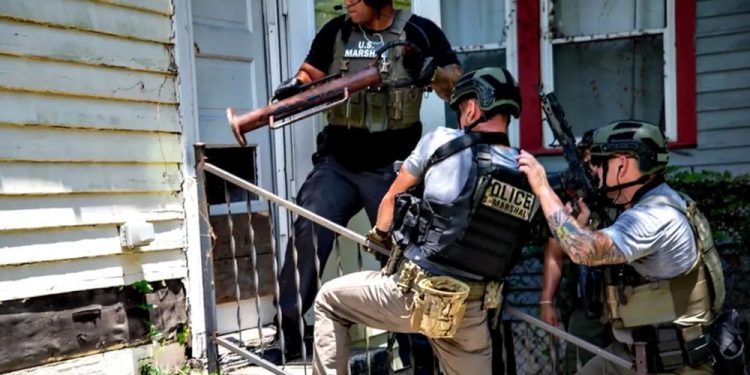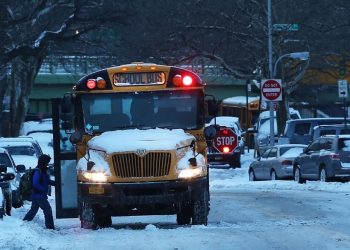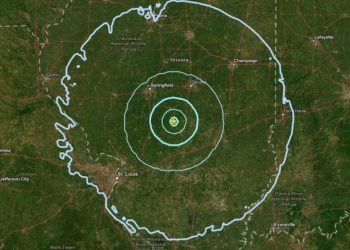Federal and local authorities rescued over 30 missing children and discovered various trafficking organizations targeting vulnerable youth. During a concerted crackdown across Texas
The collaborative expedition known as “Operation Lightning Bug” resulted in arrests, felony warrants, and several additional investigations, with its headquarters in San Antonio.
Teams from the United States Marshals Service (USMS) in San Antonio, Del Rio, Midland, and Pecos worked along with the San Antonio Police Department’s Missing Persons Unit, Special Victims Unit, Street Crimes Unit, and covert operations. They searched Texas and national crime databases to identify at-risk youngsters and coordinate recovery operations.
Results included:
- Three arrests for harboring runaways
- Nine felony warrants executed
- Six sex trafficking survivors rescued and connected with support services
- Five new trafficking investigations opened
- More than 30 missing juveniles located
- More than 120 additional juveniles voluntarily returned home, clearing their names from missing persons databases
SAPD’s Special Victims Unit interviewed each identified youngster to determine whether they had been victimized. Survivors were directed to support services given by agencies such as Health and Human Services to ensure long-term care and protection.
U.S. Marshal Susan Pamerleau for the Western District of Texas stated in a statement that protecting children remained vital to the Marshals Service’s mission.
“The safety of our children is the safety of our communities, and justice demands that we protect those who cannot protect themselves,” Pamerleau said. “Through Operation Lightning Bug, we reaffirm our promise to safeguard the most vulnerable and strengthen the safety of our communities.”
San Antonio Police Chief William McManus shared those comments, hailing the initiative as a model of law enforcement unity.
“Every suspect arrested, juvenile returned home and survivor taken out of harm’s way matters,” McManus said. “This operation demonstrates what can be achieved when law enforcement agencies unite to protect children.”
The U.S. Marshals conducted the sweep under the authority of the Justice for Victims of Trafficking Act of 2015, which allows the agency to collect missing or endangered children even when no fugitive is present. That law also resulted in the establishment of the USMS Missing Child Unit, which oversees similar recovery efforts across the country.
Kirsta Leeberg-Melton, founder and CEO of the Institute to Combat Trafficking, said operations like this one highlight the greater issue of exploitation in Texas and elsewhere.
“Trafficking is something that the city of San Antonio and the state of Texas and the nation have been grappling with for a considerable period of time,” she said in an interview with Fox News Digital.
She said traffickers frequently target children who lack constant housing, food, or family support.
“They are easy pickings for traffickers to take advantage of,” she warned. “They exploit these needs by offering those items and then calling in debts and putting those kids in a position where they are able to exploit them for sex or for labor.”
According to Leeberg-Melton, the general public frequently underestimates the prevalence of trafficking, as well as how far it has gone, particularly online.
“Trafficking is the exploitation of men, women and children for forced sex or forced labor by a third party for their profit or gain. That’s been around forever,” Leeberg-Melton said. “What hasn’t really been around is people’s understanding of that crime and their knowledge that it’s happening everywhere!”
She went on to say that traffickers are increasingly using technology to recruit and manipulate their victims.
“As technology advances, traffickers…are early adopters and adapters of technology,” she said. “The internet allows them to connect with victims and buyers far beyond their local area.”
Leeberg-Melton emphasized that trafficking does not only occur in border regions.
“American citizens can traffic American citizens on American soil,” she said, adding that most trafficking cases prosecuted in the U.S. involve American perpetrators exploiting American victims.
“The biggest myth is that it happens somewhere else, and it happens to someone else,” she said. “Until we start recognizing that people have value, no matter who they are, where they come from, what they’ve done or what’s been done to them, we will continue to excuse some level of exploitation.”
Leeberg-Melton also identified sextortion as a developing form of trafficking that uses coercion to induce sexual behavior or imagery.
“When you have someone that you are holding something over their head and then you are asking them for additional photographs or additional sexual conduct with the threat…that is a form, frankly, of human trafficking,” she said.
If you think someone is a victim of trafficking, call the National Human Trafficking Hotline at 1-888-373-7888 or report anonymously at humantraffickinghotline.org.









